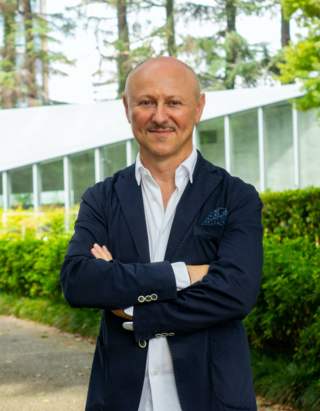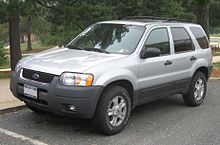
Automobiles Ettore Bugatti was a German then French manufacturer of high-performance automobiles. The company was founded in 1909 in the then-German city of Molsheim, Alsace, by the Italian-born industrial designer Ettore Bugatti. The cars were known for their design beauty and numerous race victories. Famous Bugatti automobiles include the Type 35 Grand Prix cars, the Type 41 "Royale", the Type 57 "Atlantic" and the Type 55 sports car.

The Renault Espace is a series of automobiles manufactured by Renault since 1984. For its first five generations, the Espace was a multi-purpose vehicle/MPV (M-segment), but it has been redesigned as a mid-size crossover SUV for its sixth generation.

The Geneva International Motor Show is an annual auto show held in March in the Swiss city of Geneva.

The International Motor Show Germany or International Mobility Show Germany, in German known as the Internationale Automobil-Ausstellung, is one of the world's largest mobility trade fairs. It consists of two separate fairs, that subdivided in 1991. While the IAA Mobility displays passenger vehicles, motorcycles and bikes, the IAA Transportation specializes in commercial vehicles. Before the separation, the show was held solely at the Messe Frankfurt.
Moray S. Callum is a Scottish automobile designer who was vice president, design, for Ford Motor Company, having retired on 1 May 2021. His elder brother Ian Callum was the Design Director of Jaguar from 1999 to 2019.

Patrick Gilles Marie Le Quément is a retired French car designer, formerly chief designer of Renault. Born in France but brought up in the United Kingdom, Le Quément holds a BA Hons. degree in Product Design from Birmingham Institute of Art and Design, and an MBA from Danbury Park Management Centre.
The Salón Internacional del Automóvil México or simply SIAM was an annual auto show held at the Banamex convention center of the Hipódromo de las Américas racecourse in Mexico City, Mexico. Planned as a successor to the Auto Expo del Automóvil it span only three editions from 2004 to 2006.

The Mazda Ryuga is a concept car introduced by Mazda and partner Ford at the 2007 North American International Auto Show in Detroit, Michigan. The car, along with the Mazda Nagare which was introduced at the Greater Los Angeles Auto Show, is an exploratory design study intended to illustrate future styling directions for future Mazda passenger vehicles. The Ryuga moniker is Japanese for "gracious flow".

The Mazda Nagare is a concept car that was introduced by Mazda at the 2006 Los Angeles Auto Show. The Nagare is considered to be an exercise in natural and organic car design to explore the future of Mazda automobiles. Its name “Nagare” translates into English as “flow” and the designers specifically studied motion and the effect it has on natural surroundings when creating this vehicle.

The Mazda Hakaze is a concept car that was revealed in early February 2007 by Japanese manufacturer Mazda. Its major design elements come from a new design language developed by Mazda called Nagare, designed by Laurens van den Acker, which also designed other Mazda concepts, and most notably the Renault Clio and Renault Captur. This element has been used on past Mazda concept cars such as: Mazda Nagare; Mazda Ryuga; Mazda Kabura.

The Mazda Furai was a concept car revealed on 27 December 2007 and designed by Swift Engineering and manufactured by Mazda. A teaser image of the vehicle was released on 11 December 2007. The Furai officially debuted at the 2008 North American International Auto Show in Detroit.

The 2010 Paris Motor Show took place from 2 October to 17 October 2010, in Paris expo Porte de Versailles.

The Renault Twizy is a two-seat electric microcar designed and marketed by Renault. It is classified in Europe as either a light or heavy quadricycle depending on the output power, which is either 4 kW (5.4 hp) for the 45 model or 13 kW (17 hp) for the 80 model, both names reflecting its top speed in km/h. Originally manufactured in Valladolid, Spain, production was moved to Busan in South Korea in March 2019 to meet increased demand in Asia. In July 2023 it was announced that production of the Twizy was to end in September 2023; it is to be replaced by the new Mobilize Duo.

The Renault Captur is a series of subcompact crossover SUVs manufactured by the French automaker Renault. The production version of the first one, based on the B platform, made its debut at the 2013 Geneva Motor Show and started to be marketed in France during April 2013. The Captur Concept was first shown at the 2011 Geneva Motor Show.

The Renault Frendzy was a concept leisure activity vehicle (M-segment) designed by Renault for the 2011 Frankfurt Motor Show at a similar size to the production Renault Kangoo. Its concept was designed by Renault's design chief Laurens Van den Acker with the exterior design accredited to Deyan Denkov.
A retro-style automobile is a vehicle that is styled to appear like cars from previous decades. Often these cars use modern technology and production techniques. This design trend developed in the early 1990s and led to almost all automobile brands introducing models that referenced previous cars of the 1950s and 1960s.
Nagare(流, flow) is an automotive design language created by Franz von Holzhausen and Laurens van den Acker for Mazda. Incorporated into a number of concept cars, starting with the car of the same name, the Nagare design lineup was intended as a showcase of what Mazda's cars may have looked like in 2020.

The Renault Symbioz is an electric concept car developed by Renault, which was unveiled at the 2017 International Motor Show Germany.

Fabio Filippini is an Italian car designer. Former Design Director of Pininfarina, is currently an independent Car Design consultant and Design Strategy advisor.




















